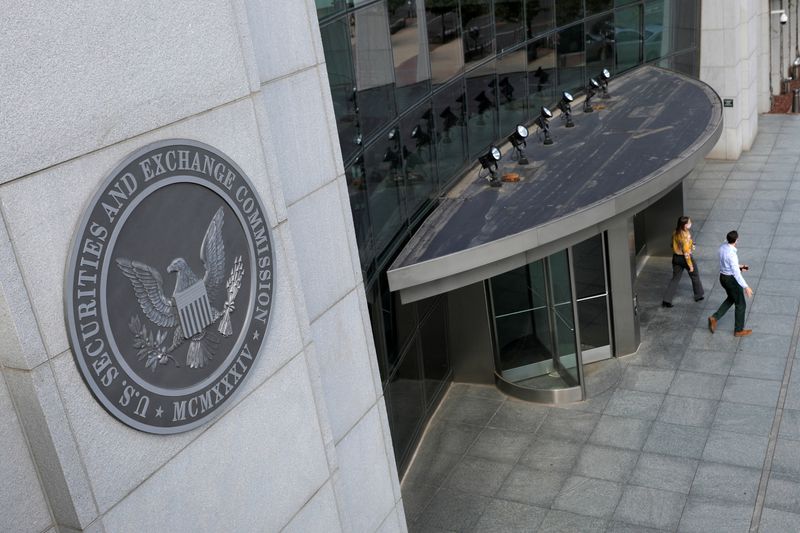By Douglas Gillison, Laura Matthews and Carolina Mandl
NEW YORK/WASHINGTON (Reuters) -Wall Street's top regulator on Wednesday adopted new rules aimed at reducing systemic risk in the $26 trillion U.S. Treasury market by forcing more trades through clearing houses, while offering some concessions following industry pushback.
The five-member U.S. Securities and Exchange Commission voted 4-1 on Wednesday to finalize the new rules, proposed over a year ago, marking the most significant overhaul in decades of the world's largest bond market, a global benchmark for assets.
The reforms, which require some cash Treasury and repurchase or "repo" agreements to be centrally cleared, are part of a broader government effort to fix structural issues regulators believe are causing market volatility and liquidity problems. They will become effective in phases by June 2026.
"Today is the most significant day for U.S. Treasury market structure in decades. The SEC's final rule will reassemble the way that the Treasury market functions," said Nathaniel Wuerffel, head of market structure at BNY Mellon (NYSE:BK), a major Treasury market participant.
The reforms in part target hedge funds and proprietary trading firms, which have become an ever-larger part of the Treasury market over the past decade but are relatively lightly regulated. Debt-fueled bets by those firms, also known as "basis trades," have drawn scrutiny from regulators who worry that an abrupt unwind of leveraged positions could strain markets.
Moody's (NYSE:MCO) credit agency in November said those risks could be reduced by forcing trades through a central clearer, which acts as the buyer to every seller, and seller to every buyer, guaranteeing trades in case either party defaults.
"Today's final rules, taken together, will reduce risk across a vital part of our capital markets in normal times and stress times," SEC Chair Gary Gensler said in prepared remarks.
The rule broadens the scope of which transactions must be cleared, requiring clearing houses in the Treasury market to ensure that their members, mostly big broker dealers, clear cash Treasury trades. It will also require that broker dealers clear repurchase (repo) and reverse repo transactions with their clients.
That would sweep in more hedge fund-related trades. Most hedge fund activity in repo markets - where banks and other players such as hedge funds borrow short-term loans backed by Treasuries and other securities - is done bilaterally between the broker dealers and its client.
The market is central to the basis trade, which takes advantage of the premium of futures contracts over the price of the underlying Treasury bonds. The trades - typically the domain of macro hedge funds with relative value strategies - involve selling a futures contract, buying Treasuries deliverable into that contract with repo funding, and delivering them at contract expiry.
Market practice suggests a large share of hedge funds trading in repo markets put up no haircut, indicating that they are fueling activity using enormous amounts of cheap debt.
Gensler told reporters the market currently operates on a "risky foundation of trades" handled bilaterally, including "a significant amount of leverage in the prime brokerage relationships between banks, brokerages and hedge funds."
PHASE-IN
The Fixed Income Clearing Corporation is the country's sole clearer of Treasuries. While advocates say clearing makes markets safer, critics say the requirement to post margin or collateral to secure trades adds costs which could reduce liquidity.
In a nod to worries expressed by industry groups, SEC officials told reporters ahead of Wednesday's vote they had softened some of the original proposals. Notably, purchases and sales of Treasuries between broker-dealers and hedge funds or levered accounts will not have to be cleared because clearing repo trades would largely cover the related risks, they said.
The Managed Funds Associations (MFA), which represents hedge funds, said it applauded that decision.
"Ultimately, how the SEC and the Fixed Income Clearing Corporation implement the final rule ... will determine the rule's impact on market liquidity and efficiency," MFA's Chief Counsel Jennifer Han said in a statement.
Under the new rule, central clearing houses would also have to keep the collateral for their members separate from that held on behalf of their members' customers.
Overall, just 13% of Treasury cash transactions are centrally cleared, according to estimates in a Treasury Department report based on 2017 data.
Market participants had been worried about the implementation timeframe, which was "better than expected," said Wuerffel. Clearing houses have until March 2025 to comply with provisions on risk management, protection of customer assets and access to clearance and settlement services.
Their members will have until December 2025 to begin central clearing of cash market Treasury transactions and June 30, 2026 for repo transactions.
Still, many market participants warned there would be a lot of work to do in that time.
"There are a number of operational challenges that need to be addressed to ensure a cost-effective, safe and efficient client clearing structure," said Scott O'Malia, CEO of broker-dealer trade group the International Swaps and Derivatives Associations.
